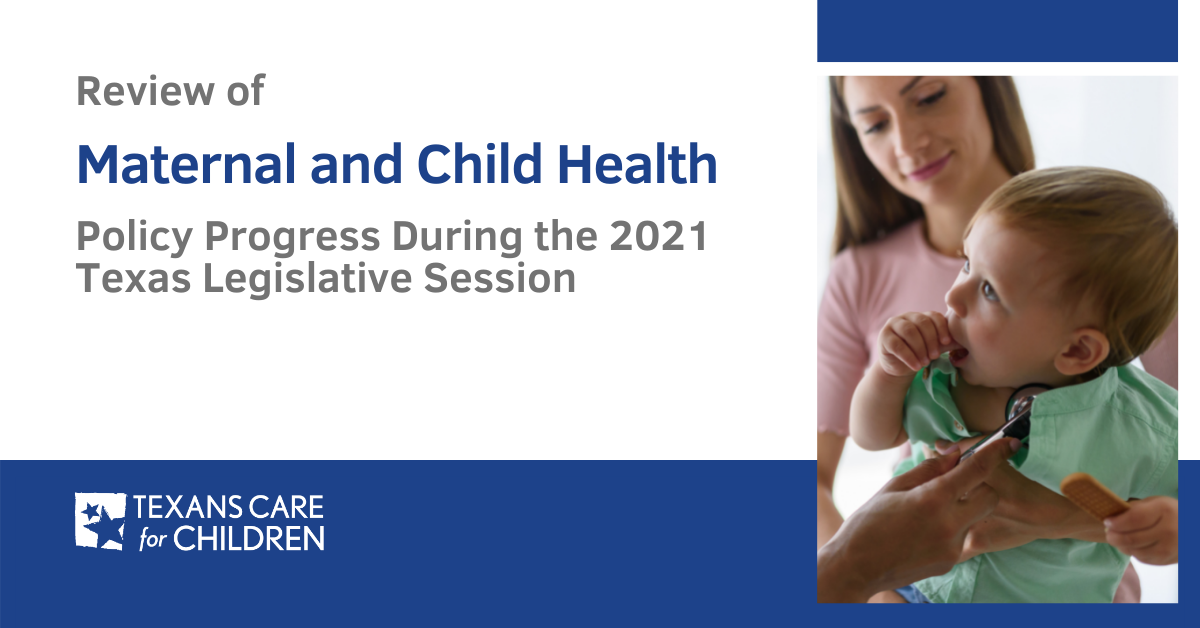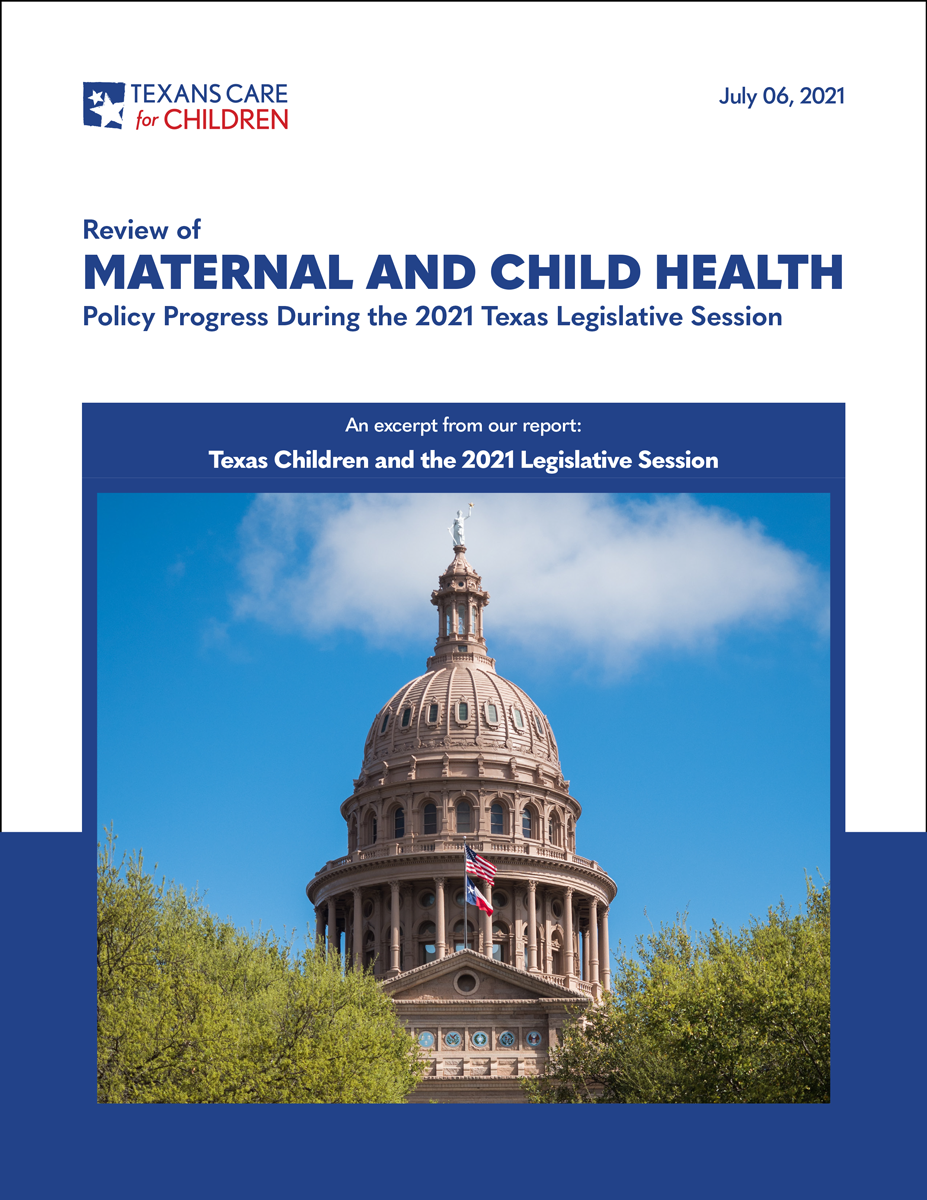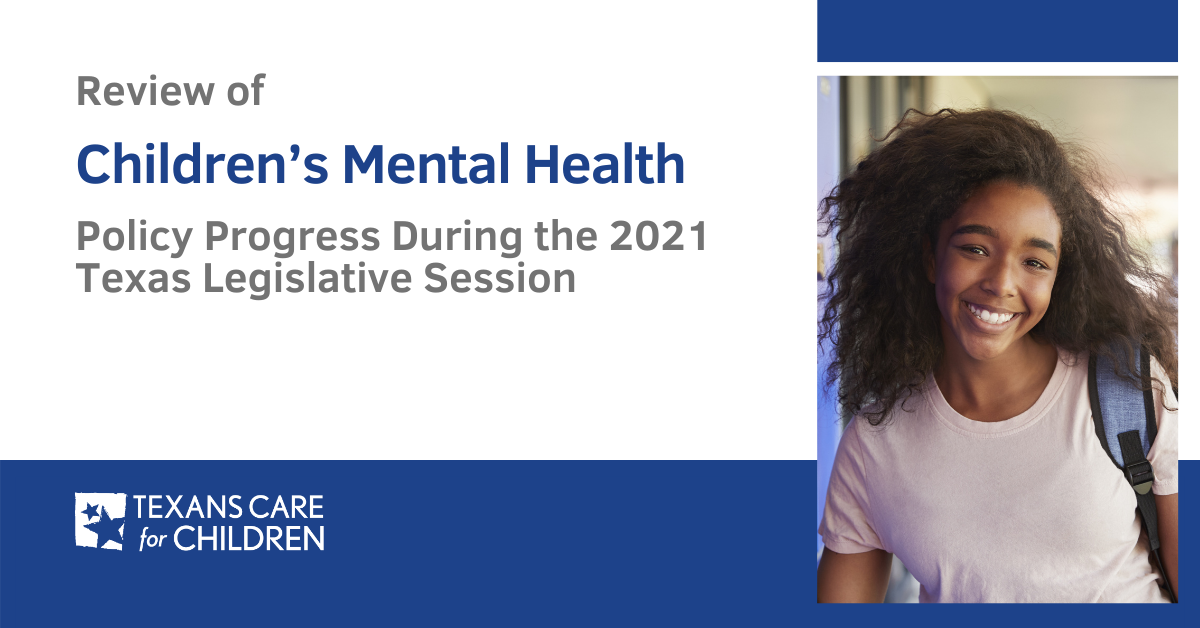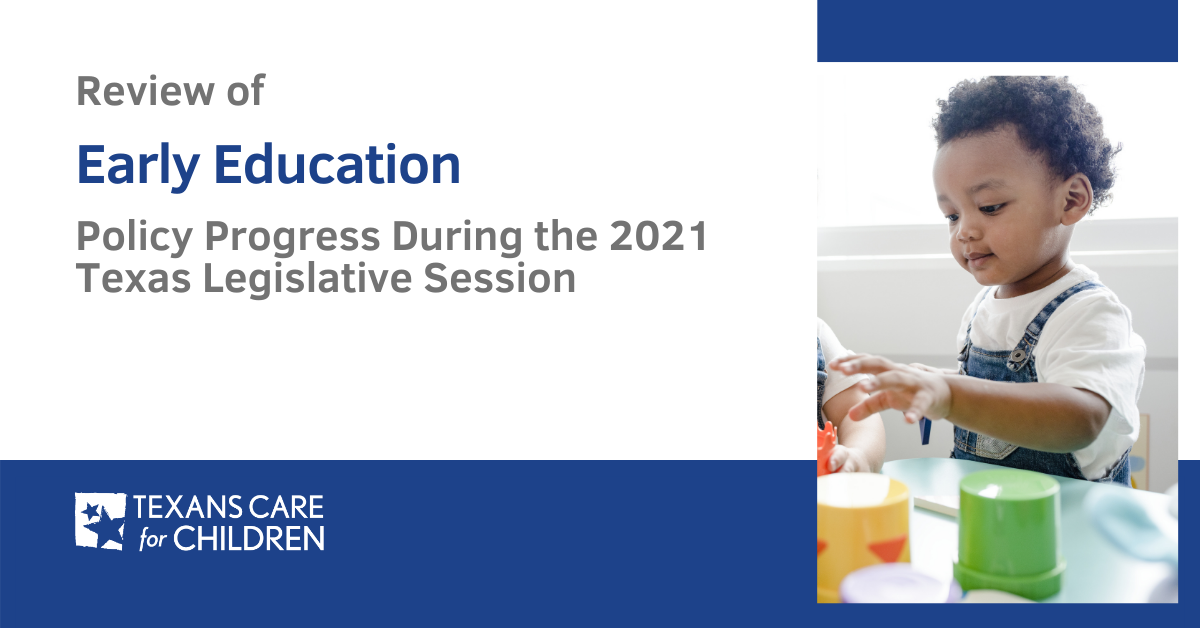In 2021, the Legislature passed two significant health care bills after years of advocacy, HB 133 and HB 290, but our greatest disappointment of the session was that the Legislature took no action to draw down federal Medicaid expansion funding to cover 1.4 million uninsured Texas adults — by far the biggest tool available in the Legislature’s toolkit to improve access to health care. Our team helped spearhead efforts to successfully pass HB 133, which will allow moms to keep their Medicaid health coverage for six months after childbirth rather than the current two months, and a scaled down version of HB 290, which will prevent children from losing their Medicaid health coverage due to inaccurate midyear eligibility reviews. Additionally, our coalition worked with legislators to successfully stop a planned cut to funding for Early Childhood Intervention (ECI) for infants and toddlers with disabilities and developmental delays. However, the Legislature failed to increase funding for ECI, women’s health, and other programs to keep up with the state’s needs. HB 133, HB 290, and ECI funding were all priorities for the Texas Prenatal to Three Collaborative, an initiative to ensure that state policies support infants, toddlers, and their parents during the critical years of early childhood.
After years of effort on the issue by families, coalition partners, and legislators, the Legislature passed HB 133 to allow moms to keep their Medicaid health insurance for six months after pregnancy rather than the current two months. The original version of the bill, which passed the House, would have provided for 12 months of postpartum health coverage. While we agree with the state’s Maternal Mortality and Morbidity Review Committee that moms need a full 12 months of comprehensive health care after pregnancy, we are very pleased to see the extension to six months. We greatly appreciate the efforts of Speaker Dade Phelan, Rep. Toni Rose, and Sen. Lois Kolkhorst to pass the bill. Texas must now seek a federal Medicaid waiver to implement the legislation using federal funds. We urge state and federal officials to work together to quickly implement HB 133 while also working on solutions to ensure that moms have health coverage before their pregnancy and after the six months of coverage included in HB 133.
Similar to HB 133, the passage of HB 290 to help children keep their health coverage was the result of years of work by a number of advocates in the Children’s Health Coverage Coalition. We appreciate Speaker Dade Phelan, Sen. Lois Kolkhorst, Rep. James Frank, and Rep. Philip Cortez working together to pass it this session. Currently, children who receive their health insurance through Medicaid are subject to as many as four midyear eligibility reviews that often mistakenly remove children from health coverage. The version of HB 290 that passed (as a last-minute amendment to HB 2658) will allow only one midyear eligibility review and provide families with 30 days — rather than 10 days — to gather and submit the requested documentation. It will be important to monitor the implementation of the bill to ensure that it achieves the Legislature’s goal of ensuring that eligible children remain enrolled in their health coverage and continue to receive uninterrupted health care.
Other important health care legislation to pass this session includes HB 4 by Rep. Four Price and Sen. Dawn Buckingham to expand access to telehealth; SB 1059 by Sen. Angela Paxton and Rep. Stephanie Klick to streamline Medicaid enrollment and renewal process for former foster youth so they have consistent access to health care; and SB 672 by Sen. Buckingham and Rep. Greg Bonnen to make collaborative care a Medicaid-reimbursable service so mental health care can be better integrated into the primary care setting.
This session, our team also led the successful coalition effort to stop the budget cut that the Senate passed for ECI funding for infants and toddlers with disabilities and developmental delays. The Senate initially approved only $315 million for ECI, a significant reduction from the current $342 million. Ultimately, we were able to secure $339 million for ECI — essentially maintaining level funding — when the House and Senate conference committee finalized the budget.
While we were pleased to stop the cut to ECI, in the future it will be important for the Legislature to continue the successful efforts made during the 2019 legislative session towards increasing ECI appropriations to restore funding to the same per-child level at which it was funded from 2012 to 2015. Adequate funding for ECI is critical for ensuring that no more programs close, stabilizing and continuing to grow enrollment to reflect the growing population of Texas children, and rejuvenating outreach efforts to ensure that all eligible infants and toddlers with disabilities and delays receive ECI services in a timely manner.
The state budget was a mixed bag in other ways, too. Like ECI, Healthy Texas Women (HTW) and Family Planning Program (FPP) received flat funding compared to the amount appropriated last biennium — certainly better than a cut, but not enough funding to meet the state’s needs. On paper, the $352.6 million funding total for women’s health programs increased slightly, but only because the Legislature funded two years of the recently launched HTW Plus postpartum benefits compared to the one year funded in the 2019 session. Additionally, a portion of that funding appropriated for the women’s health programs’ budget (about $8 to $10 million) will be devoted to implementation of HB 133 in FY 2023. In the future, the Legislature will need to ensure that funding for the women’s health programs keeps up with demand for the programs and anticipated caseload growth, particularly since FPP providers have routinely run out of funding needed to meet the high demand for their services. In other areas, the Legislature actually cut funding. For example, the Legislature cut funding for the state workforce that enrolls Texans in Healthy Texas Women, Medicaid, CHIP, and SNAP, potentially creating delays for children, pregnant women, and other Texans who need these services. However, we were pleased the Legislature continued $16 million over the biennium for a $500 Medicaid add-on payment for labor and delivery services provided by rural hospitals and maintained $7 million over the biennium to continue maternal health initiatives at the Department of State Health Services, including the TexasAIM initiative to better equip hospitals to prevent pregnancy and birth complications.
We were also disappointed that the Legislature failed to pass SB 1858 by Sen. Beverly Powell, which would have promoted group prenatal and group well-child care models, such as CenteringPregnancy and CenteringParenting, and HB 4139 by Rep. Garnet Coleman, which would have reinstated the state Office for Health Equity. Fortunately, after the legislative session, the Department of State Health Services (DSHS) announced that it is using federal COVID relief funds to establish an office to address equity.
Our greatest disappointment of the legislative session is that the Legislature took no action to accept federal Medicaid expansion funding. The funding would provide a health insurance option to an estimated 1.4 million uninsured grocery store clerks, cooks, waiters and waitresses, construction workers, and other Texans who do not receive insurance from their jobs. For the first time, a majority of the Texas House officially endorsed a proposal to accept Medicaid expansion funding, signing onto HB 3871 by Rep. Julie Johnson, which would have directed state leaders to negotiate a Medicaid waiver with the federal government to draw down the funding and establish a Live Well Texas program to offer health insurance. However, the Legislature did not hold a hearing on this or any of the other bills filed to expand health coverage. The House and Senate both voted down floor amendments to accept the funding. As Texas continues to hold the distinction of the nation’s worst uninsured rate, state leaders will need to develop a plan to expand health coverage. The state’s current application to the federal government for funding to reimburse hospitals and mental health providers for uncompensated care should be expanded to include a health coverage plan.





